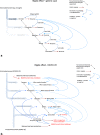Resilience of local food systems and links to food security - A review of some important concepts in the context of COVID-19 and other shocks
- PMID: 32837646
- PMCID: PMC7351643
- DOI: 10.1007/s12571-020-01076-1
Resilience of local food systems and links to food security - A review of some important concepts in the context of COVID-19 and other shocks
Abstract
The objective of this review is to explore and discuss the concept of local food system resilience in light of the disruptions brought to those systems by the 2020 COVID-19 pandemic. The discussion, which focuses on low and middle income countries, considers also the other shocks and stressors that generally affect local food systems and their actors in those countries (weather-related, economic, political or social disturbances). The review of existing (mainly grey or media-based) accounts on COVID-19 suggests that, with the exception of those who lost members of their family to the virus, as per June 2020 the main impact of the pandemic derives mainly from the lockdown and mobility restrictions imposed by national/local governments, and the consequence that the subsequent loss of income and purchasing power has on people's food security, in particular the poor. The paper then uses the most prominent advances made recently in the literature on household resilience in the context of food security and humanitarian crises to identify a series of lessons that can be used to improve our understanding of food system resilience and its link to food security in the context of the COVID-19 crisis and other shocks. Those lessons include principles about the measurement of food system resilience and suggestions about the types of interventions that could potentially strengthen the abilities of actors (including policy makers) to respond more appropriately to adverse events affecting food systems in the future.
Keywords: COVID-19; Food security; Food systems; Resilience; Shocks.
© The Author(s) 2020.
Conflict of interest statement
Conflict of interestThe author declares no conflict of interest.
Figures


References
-
- Abdul-Razak M, Kruse S. The adaptive capacity of smallholder farmers to climate change in the Northern Region of Ghana. Climate Risk Management. 2017;17:104–122.
-
- Aldrich D. Fixing recovery: social capital in post-Crisis resilience. Journal of Homeland Security. 2010;6:1–10.
-
- Ansah IGK, Gardebroek C, Ihle R. Resilience and household food security: a review of concepts, methodological approaches and empirical evidence. Food Security. 2019;11:1187–1203. doi: 10.1007/s12571-019-00968-1. - DOI
-
- Arslan A, McCarthy N, Lipper L, Asfaw S, Cattaneo A, Kokwe M. Climate smart agriculture? Assessing the adaptation implications in Zambia. Journal of Agriculture Economics. 2015;66(3):753–780. doi: 10.1111/1477-9552.12107. - DOI
-
- Asfaw S, Davis B. Can cash transfer programmes promote household resilience? Cross-country evidence from Sub-Saharan Africa. In: Lipper L, editor. Climate Smart Agriculture. Cham: Springer; 2018. pp. 227–250.
Publication types
LinkOut - more resources
Full Text Sources
